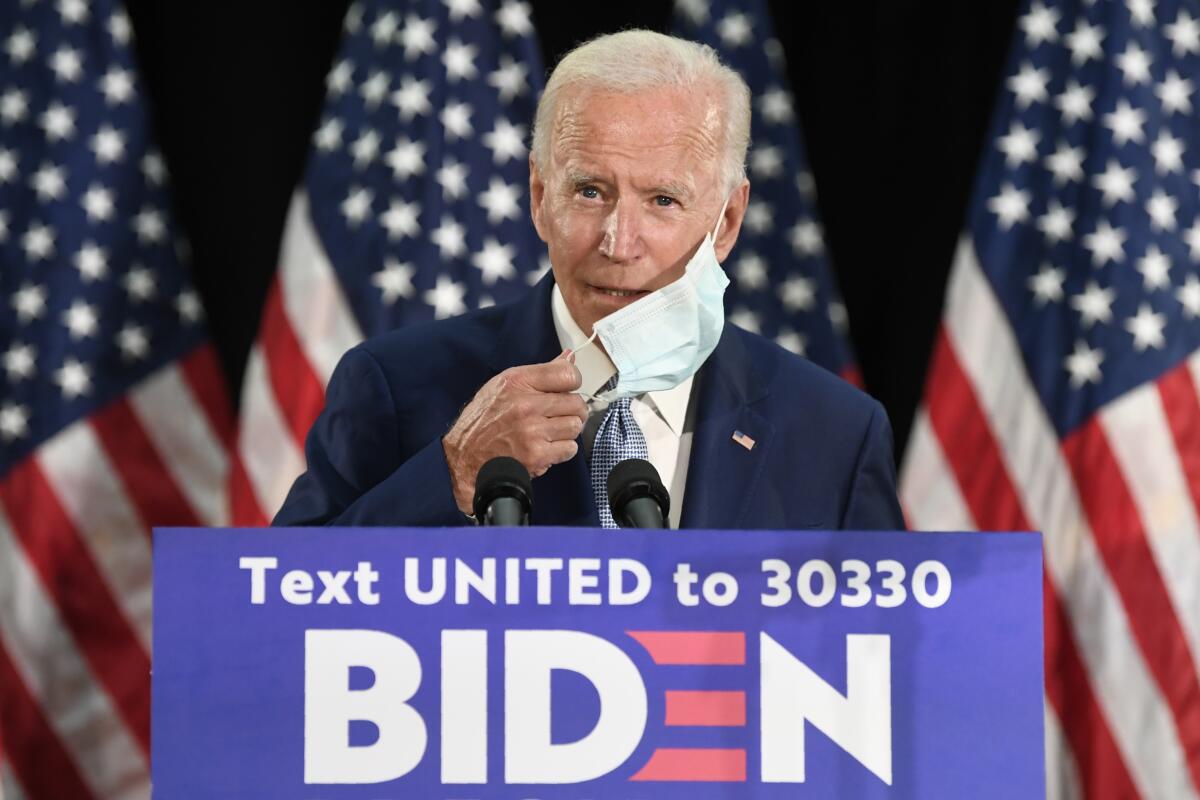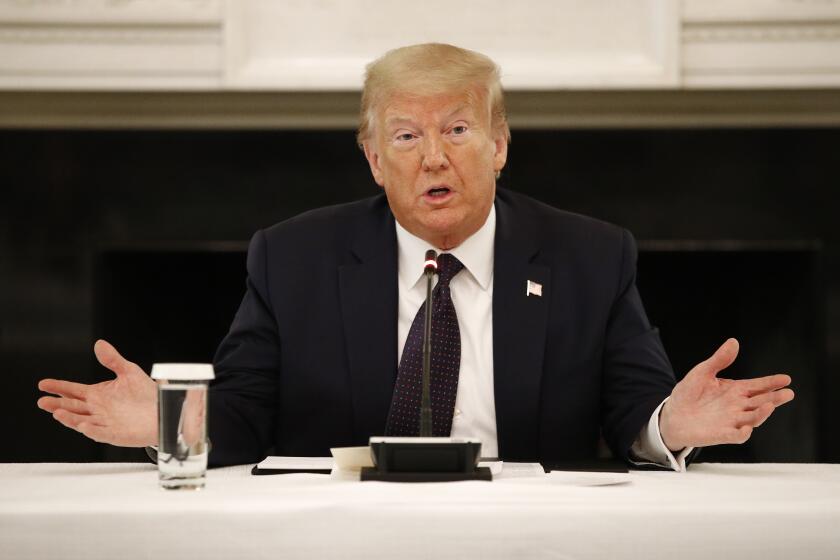Column: Defund police? Let’s start with reform

- Share via
WASHINGTON — Anybody remember “Abolish ICE?”
That was progressives’ impassioned cry last year after Immigrations and Customs Enforcement agents imprisoned undocumented immigrant children in cages. It was a litmus test of compassion for Democrats running for president.
Sen. Kirsten Gillibrand of New York said yes, “abolish ICE.” Sen. Elizabeth Warren of Massachusetts said she’d “replace” the agency. Sen. Bernie Sanders of Vermont said he’d “restructure” it.
How to reshape the nation’s police forces has become a major campaign issue. President Trump hopes to portray Joe Biden as extreme.
But Joe Biden, the leading moderate in the race, refused to get near the idea. Eventually, “Abolish ICE” disappeared — and Biden won the nomination.
Now, after George Floyd’s death under the knee of a Minneapolis police officer, progressive groups have raised a new banner: “Defund the police.”
It may be the worst political slogan ever coined.
For one thing, its proponents say it doesn’t mean what it sounds like — the abolition of police departments, a proposal that would be an election year gift to President Trump.
The defunders say they want to trim police budgets and redirect the money to social services, and let cops go back to solving crimes and other core functions. Even then, the idea is massively unpopular.
A Yahoo News/YouGov poll last week found only 16% of Democrats favor cuts in police funding. Republicans are even less enthusiastic.
“Abolish ICE” was more popular than that.
Biden’s response was crisp. “I don‘t support defunding the police,” he said Monday. “I support conditioning federal aid to police based on whether or not they meet certain basic standards of decency.”
That’s no surprise. Biden is a man of the center — the center of the Democratic Party, that is. He built his Senate career as a “law and order” candidate during the high-crime era, with strong support from police unions.
He’s moved left since then, but “Defund the police?” His 77-year-old political antennae are too well-tuned for that.
More striking were the similar reactions of most other Democrats, including leading progressives. Sanders said he wants to pay well-trained police officers more, not less. Rep. Karen Bass (D-Los Angeles), chair of the Congressional Black Caucus, said the slogan was “a distraction.”
Instead of defunding police, House Democrats plan to pass a sweeping police reform bill with a long list of sensible proposals: a ban on federal aid for police departments that use chokeholds, mandated use of body cameras for police, a change in qualified immunity laws to let people seek civil damages against abusive police, and a national misconduct registry to track bad cops.
Biden has endorsed the bill, which is similar to criminal justice proposals he has outlined.
“Let us vow to make this, at last, an era of action to reverse systemic racism,” he said in a passionate speech in Philadelphia last week. “Bad cops should be dealt with severely and swiftly. We all need to take a hard look at the culture that allows for these senseless tragedies to keep happening.”
And here’s what may be the most important development: Most of the public agrees.
A series of public opinion polls found that the wave of overwhelmingly peaceful protests that followed Floyd’s death crystallized a remarkable shift in public opinion — in favor of reform.
The Yahoo/YouGov poll, for example, found that fully two-thirds of Americans want to ban police from using chokeholds, including 48% of Republicans.
A Monmouth poll found that 57% of Americans believe police officers are more likely to use excessive force in a confrontation if the target is Black; four years ago, only 34% gave that answer.
What provoked the huge change in public sentiment? I’ll nominate an obvious cause: ubiquitous cellphone cameras, which enable protesters and bystanders to record police misconduct and upload it to social media.
In an earlier era, the Minneapolis police could claim — as they tried to do this time — that Floyd died in a violent struggle with officers. But we know otherwise, because we watched him die after nearly nine agonizing minutes with an armed officer pressing his full weight on his neck and others holding his legs.
As the protests swelled, Trump resorted to the age-old playbook of “law and order,” charging that the problem was violent agitators running amok. But anyone with a smartphone could see that wasn’t true.
He tweeted that a 75-year-old protester who suffered serious head injuries after being shoved by police in Buffalo, N.Y., had faked his fall and might have been “an Antifa provocateur.” That one didn’t fly, either.
Trump normally displays a canny sense of the public mood. But he has put himself squarely on the wrong side of this issue — not only morally, but as a matter of practical politics.
He doesn’t seem to have noticed that most voters think he’s dead wrong.
Suddenly, thanks to the tragedy of Minneapolis, Democrats have an opportunity to build a majority — perhaps even a bipartisan majority — in favor of criminal justice reform.
It’s too late for George Floyd, but just in time for the November election.
More to Read
Get the L.A. Times Politics newsletter
Deeply reported insights into legislation, politics and policy from Sacramento, Washington and beyond. In your inbox three times per week.
You may occasionally receive promotional content from the Los Angeles Times.












